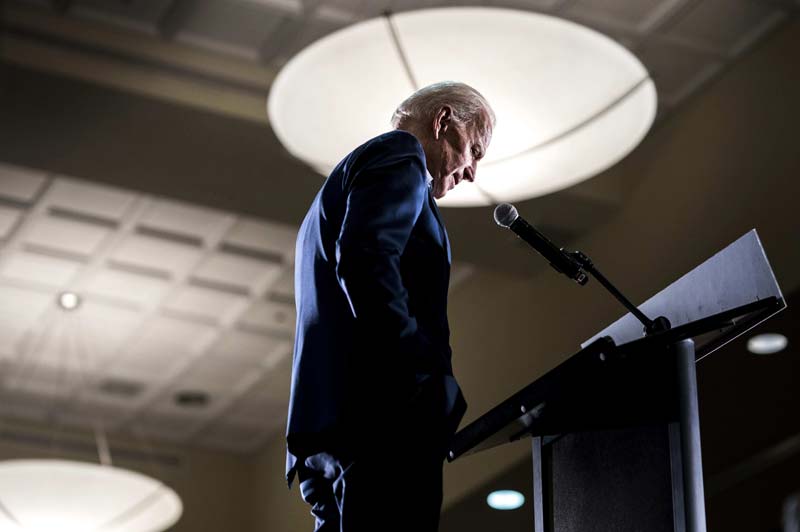 Melina Mara for The Washington Post
Melina Mara for The Washington Post
Why?
Because we (the people and the media) tend to overreact to what happens in these get-togethers, while the wounds are still fresh and the press corps more interested in "hot takes" than cogent analysis.
And, frankly, what happens well before Iowa and New Hampshire isn't always that important in the greater scheme of things (I refer you to this account of Hillary Clinton "shining" in an April 2007 debate . . . and how she later pushed for more debates, realizing she couldn't derail the Obama Express).
What I did do was go back and re-watch Thursday night's debate (Wednesday's panel, I felt, was pretty much inconsequential). Specifically, I wanted a second look at the confrontation between former Vice President Joe Biden and California Sen. Kamala Harris over busing and his embrace of segregationist senators back in the day. And I wanted to see if Biden was as inept and flat-footed as some debate reviewers contend.
My observation: Biden wasn't as awful as advertised. Yes, he could have been more forceful when responding to Harris' attack (if it were me, I'd have asked the good senator why Obama made me his running mate if I, as she seemed to suggest, I was insensitive to the plight of minorities).
At other times, Biden seemed determined not to run past his allotted time – maybe the result of too many handlers telling the voluble veep that he talks way too much (they're right, of course).
There's an easy fix here. It's not unlike what Ronald Reagan's camp faced in 1984 when its guy turned in a flat debate performance against Walter Mondale (Reagan's handlers admitted he was "more tentative" than he was in 1980 when facing Jimmy Carter).
The fix: "let Reagan be Reagan."
Which is what I'd suggest to the Democratic frontrunner and his handlers: let Biden be Biden.
The problem: what exactly does that mean?
Does letting "Biden be Biden" mean unleashing a septuagenarian with a gift for gab –and gaffes?
Does it mean owning up to the obvious: Biden likely prefers Sanders, the colonel, to Sanders, the bellowing socialist?
And what about the candidate's propensity for policy-speak – a program-listing/money-reciting affliction that comes from too many years in the Senate (Hillary had this problem in 2008 and 2016, as did John Kerry in 2004 and Bob Dole in 1996).
Back in the summer of 1988, at that year's Democratic National Convention, then-Texas Agriculture Commissioner Jim Hightower told delegates that George H. W. Bush (that's Bush 41) was "a man who was born on third base and thinks he hit a triple" (the full quote: "George has always been in another world. His is an upper-class world in which wealth is given to you at birth. He is a man who was born on third base and thinks he hit a triple.").
Such is the design flaw with Biden 2020 – the assumption that the candidate entered the game already on third base thanks to name-recognition, Obama nostalgia and an earthy appeal to Midwestern Reagan Democrats. Thus all Biden needs is a couple of early-primary wins to stroll across home plate.
The problem with that thinking: (a) it counts on Obama nostalgia that may or may not be all that powerful of a motivating force in 2020 (other than Biden, how many of the other 19 debating Democrats frequently and fondly referred to the 44 Administration?); (b) as far as securing the nomination, Biden's closer to second base than third – still in scoring position, but maybe further from home than his campaign assumes.
Here's one way to assess the lasting effects of Thursday night's debate. Forget about money (Sunday is the end of this year's second quarter of presidential fundraising). Harris should score a windfall. Then again, Biden might also have a strong second quarter (he's in California this weekend, attending a trio of fundraisers).
Where I'd look: polling – specifically, South Carolina.
In some regards, Biden 2020 is the fourth Bush campaign (that's counting runs by 41 and his two sons in 1988, 2000 and 2016) in the over-sized value it places on South Carolina. The Palmetto State served as an anti-insurgent "firewall" for father and son in 1988 and 2000 (as well as Ronald Reagan in 1980, much to the chagrin of the elder Bush). But it didn't work that way for Jeb Bush (by 2016, the state's GOP base had developed a fondness for an outsider, warts and all).
Can Biden count on South Carolina as his firewall in 2020?
Per this mid-June Post and Courier/Change Research South Carolina Poll, Biden gets 37% of the South Carolina vote. Harris, at 9%, is a very distant fourth. Biden gets 52% of the black vote, versus only 11% for Warren. Nine in ten black voters rated Biden favorably.
If Harris' premeditated and rehearsed debate attack has legs, it will show in those South Carolina numbers.
And it may show in one other way: that instead of standing on third and assuming the game's a fait accompli, Biden instead gets busy out on second base – taking a more aggressive lead, stealing signs, even figuring whether he needs to take out the catcher in a collision at the plate.
Let Biden be Biden? Sure.
But also let him know that this game may be tougher than he anticipated.


 Contact The Editor
Contact The Editor
 Articles By This Author
Articles By This Author